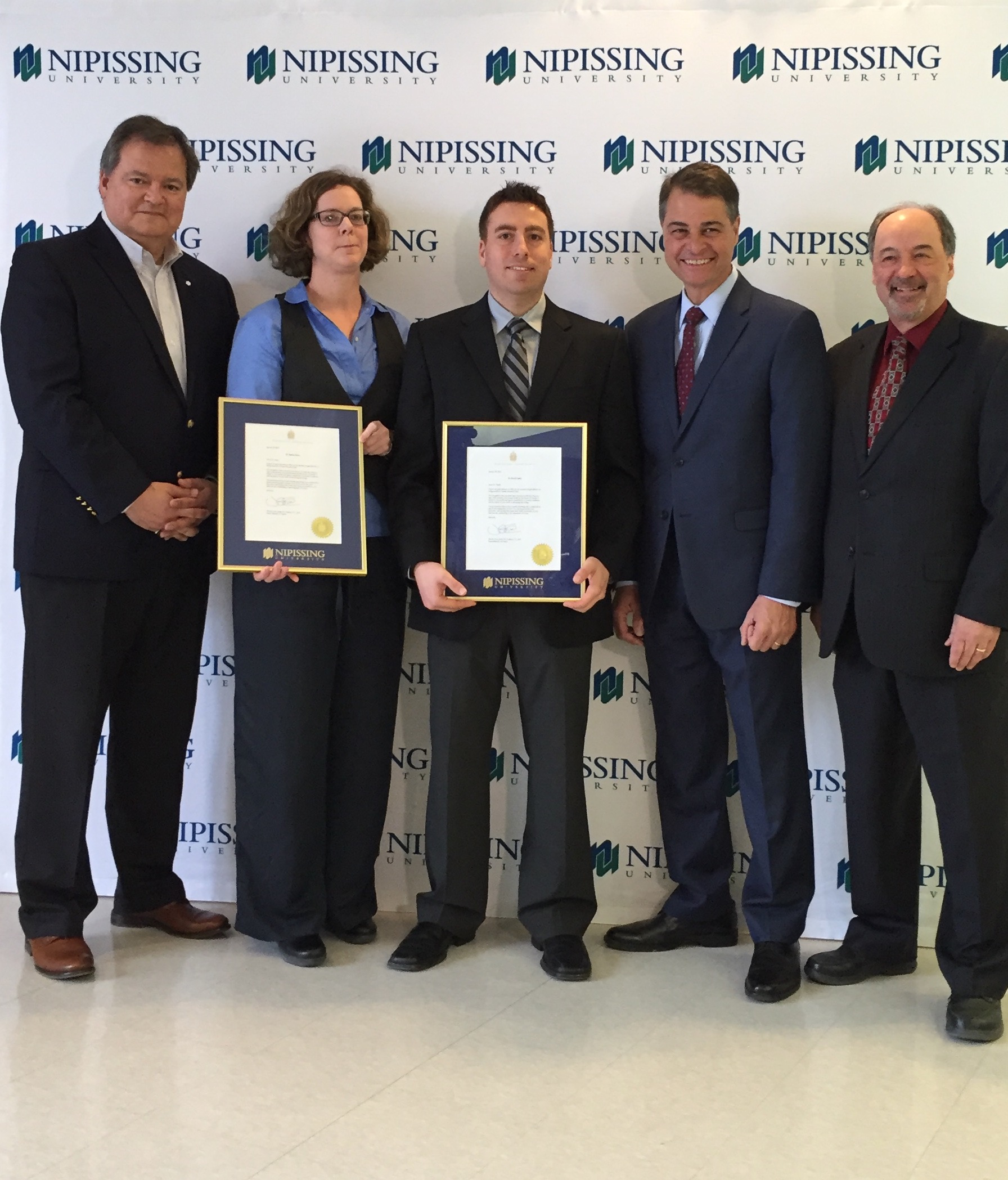$1.5 million in Canada Research Chairs for NU profs

A trio of Nipissing University professors have earned prestigious Canada Research Chairs (CRC) totalling $1.5 million over five years. The research contributes to our understanding of how watersheds work, examines the educational challenges facing youth and families in northern and rural areas, and investigates the consequences of the linked environmental history and consequences of Ontario’s Near North and the Caribbean. Nipissing will also receive $220,669 in funding from Canadian Foundation for Innovation for equipment and facilities to support the research.
Dr. April James, CRC in Watershed Analysis and Modeling: $500,000 ($100,000 per year over five years) from CRC; $57,722 from CFI. This is the second consecutive CRC that Dr. James has earned.
Dr. David Zarifa, CRC in Life Course Transitions in Northern and Rural Communities: $500,000 ($100,000 per year over five years) from CRC; $104,820 from CFI.
Dr. Kirsten Greer, CRC in Global Environmental Histories and Geographies: $500,000 ($100,000 per year over five years) from CRC; $58,127 from CFI.
“The Government of Canada is proud to support these exceptional researchers,” said Anthony Rota, MP Nipissing —Timiskaming. “These individuals are at the forefront of their respective fields and are working to create new knowledge to strengthen Canada's international competitiveness, and help educate our next generation. I am very proud of the work being accomplished at Nipissing University and funding from the CRC and CFI programs helps the university to attract and retain brilliant faculty and students.”
“This announcement is a testament to the level of high-quality research being conducted at Nipissing. We are grateful to the CRC program, the CFI and the federal government for investing in these accomplished researchers and in Nipissing University,” said Dr. Harley d’Entremont, provost and vice-president academic and research at Nipissing. “Investments of this nature assist the university in creating new knowledge that will benefit our region as well as all Canadians. This investment from the CRC also provides a significant advantage for students to learn from and work with Dr. James, Dr. Zarifa and Dr. Greer as they actively engage in leading-edge research.”
There are now four CRCs currently teaching and researching at Nipissing. Dr. Mark Bruner, CRC in Youth Development through Sport and Physical Activity, was announced in April 2015.
The Canada Research Chairs Program invests approximately $265 million per year to attract and retain some of the world’s most accomplished and promising minds. Chairholders aim to achieve research excellence in engineering and the natural sciences, health sciences, humanities, and social sciences.
Dr. April James, CRC in Watershed Analysis and Modeling studies how water moves through watersheds, from rainfall to groundwater and streamflow. Her research aims to improve our ability to understand and predict how nutrients and contaminants are transported through the landscape, and how watersheds respond to environmental impacts of climate change and land use from human activities such as urban development, agriculture, forestry and mining. Over the next 4 years, her research will focus on understanding the linkages between the watershed and Lake Nipissing and will include high frequency monitoring of river inflows to Lake Nipissing, and water and weather conditions in local bays. Working with the North Bay-Mattawa Conservation Authority and provincial agencies, observations collected by Nipissing University will provide much needed insight into the current state of water conditions in Lake Nipissing and help plan for a sustainable future. Dr. James is director ofNipissing University’s Integrative Watershed Research Centre, an interdisciplinary research center withaims to promote and support integrative research on watersheds and related environmental issues in our region of northeastern Ontario and beyond. Current members of the centre are actively engaged in research projects including the exploration of environmental history and colonialism in the Lake Nipissing watershed, water cycling studies in the Sturgeon Falls-Lake Nipissing-French River basin, study of the occurrence of harmful algae blooms in Lake Nipissing, and the exploration of the lived experience of water quality risk in Anishnaabe communities in northern Ontario.
Dr. David Zarifa, CRC in Life Course Transitions in Northern and Rural Communities, examines how individuals in northern and rural areas acquire and maintain the skills they need to succeed in today’s knowledge-driven economy. He is exploring whether some groups among northern and rural communities are under-represented in certain jobs; if the range and type of available schools and programs in northern and rural regions influence postsecondary choices and career pathways; and what unique challenges these regions face in attracting and retaining an innovative and skilled workforce. The work will help guide Canadian youth and their families as they choose from a growing array of pathways within the post-secondary education system, enter the labour market, launch their careers, and pursue success in their chosen career. His research will also change the way governments, policy makers, and education officials think about existing practices and policies.
Dr. Kirsten Greer, CRC in Global Environmental Histories and Geographies, focuses her research on the global environmental histories and geographies of two key “semi-periphery” areas in order to better understand how the circulation of people, knowledge, commodities, and organisms generated environmental consequences throughout and beyond these networks. Using two global semi-peripheries – Ontario’s Near North and the Caribbean region, her research ties these regions to broader global geopolitical and environmental processes, as well as to different forms of knowledge production involved in making the regions viable for military strategy, trade, settlement and natural resource exploitation from the 1800s-1960s.
